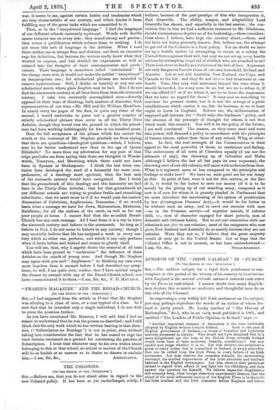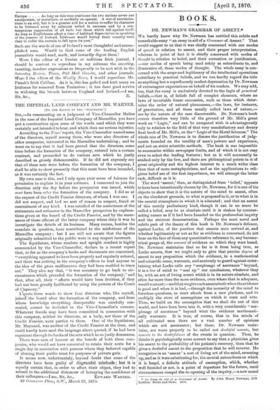APROPOS OF THE "IRISH CALIBAN " IN " PUNCH."
[TO THE EDITOR OF THE "SPECTATOR:']
Sul,—The saddest subject for a loyal Irish gentleman to con- template at this period of the history of his country in its relations with England is the mutual attitude assumed towards each other by the Press in each island. I cannot doubt that many English- men deplore this as much as moderate and thoughtful men do on this side of the Channel.
As expressing a very widely felt Irish sentiment on the subject, you may perhaps reproduce the words of an author of whom Ire- land is justly proud. Mr. Lecky (author of " The History of Rationalism," &c.), who in an early work published in 1861, and entitled "The Leaders of Public Opinion in Ireland," says :— " Another important element of dissension is the tone habitually adopted by English writers towards Ireland Such is the past of English government of Ireland,—a tissue of brutality and hypocrisy scarcely surpassed in history. Who would not have imagined that in a more enlightened age the tone of the British Press towards Ireland would have been at least moderate, friendly, conciliatory? Let any candid man judge whether it is so. Let him observe the prominence given to every crime that is committed in Ireland, to every absurdity that can be culled from the Irish Press, to every failure of an Irish movement. Let him observe the ceaseless ridicule, the unwavering contempt, the studied depreciation of the Irish character and intellect habitual in the English newspapers. Let him observe their persistent refusal to regard Irish affairs in any light but the ridiculous, and then answer the question for himself. We believe impartial Englishmen will scarcely deny, what foreign observers unanimously declare, that the object of the most influential section of the English Press is to discredit the Irish intellect and the Irish character before England and before Europe As long as this tone continues the two nations never can
amalgamate, or assimilate, or cordially co-operate. A war of recrimina- tions is an evil, but it is a greater evil for a nation to suffer its character to be frittered away by calumny veiled in sarcasm and by a con- temptuous suppression of all facts but those which tell against itself. As long as Englishmen adopt a tone of habitual depreciation in speaking of the present of Ireland, Irishmen would betray their country were they to suffer the curtain to fall upon its past."
Such are the words of one of Ireland's most thoughtful and accom- plished sons. Would to God some of the leading English journalists would read, mark, and inwardly digest them !
Were I the editor of a Fenian or seditious Irish journal, 1 should be content to reproduce in my columns the sneering, taunting, insolent expressions so frequently to be met with in the Saturday Review, Times, Pall Mall Gazette, and other journals. Were I the editor of the Weekly .News, I would reproduce Mr. Punch's Irish Caliban. As it is, this has galled and hurt many an Irishman far removed from Fenianism ; it has done good service in widening the breach between England and Ireland.—I am,



































 Previous page
Previous page